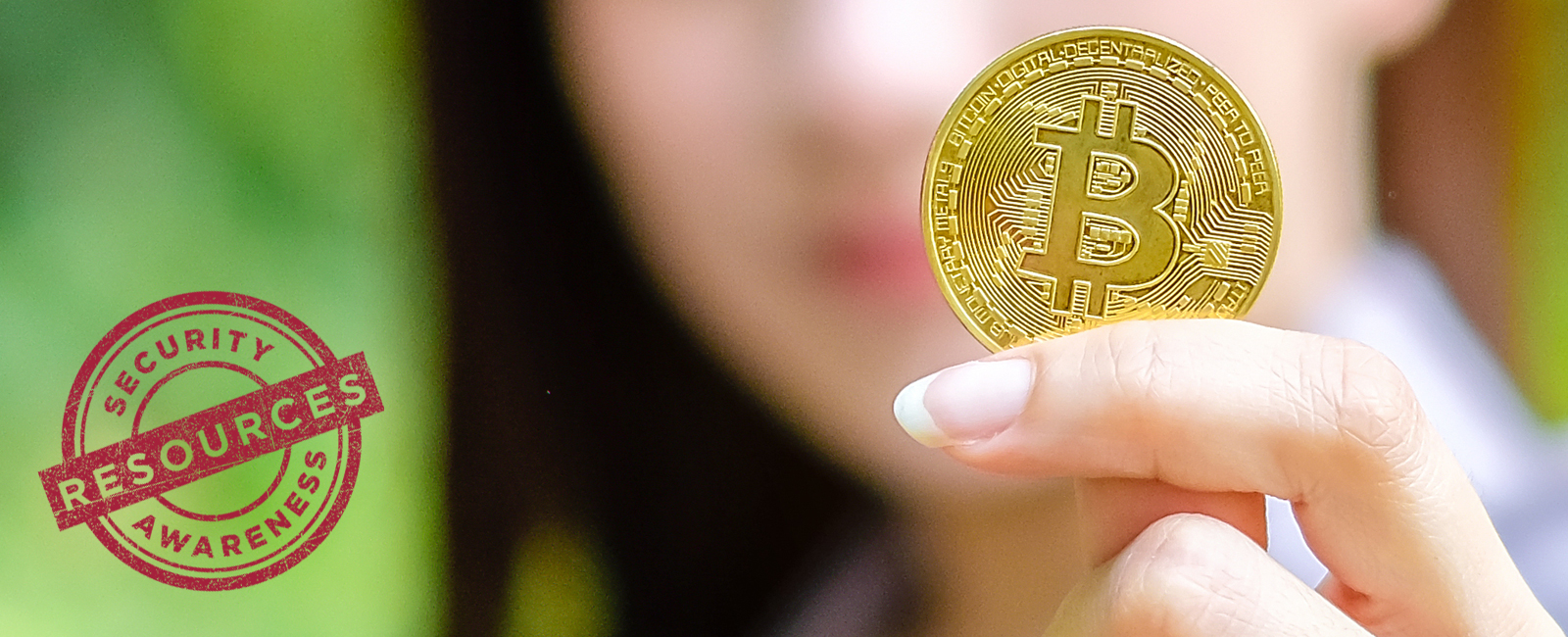Before investing in cryptocurrencies, it's important to understand the risks involved and how to shield your money from potential losses. The twelve Security Awareness blogs feature ready-made content designed to enhance security awareness.

Campus Security Awareness Campaign 2019
This post is part of a larger campaign designed to support security professionals and IT communicators as they develop or enhance their security awareness plans. The campaign is brought to you by the Awareness and Training Working Group of the EDUCAUSE Higher Education Information Security Council (HEISC). View the other monthly blog posts with ready-made content at the security awareness resource page.
Get the Word Out
Newsletter or Website Content
Cryptocurrency comes under many names. You have probably read about some of the most popular types of cryptocurrencies such as Bitcoin, Litecoin, and Ethereum. Cryptocurrencies are increasingly popular alternatives for online payments. Before converting real dollars, euros, pounds, or other traditional currencies into ₿ (the symbol for Bitcoin, the most popular cryptocurrency), you should understand what cryptocurrencies are, what the risks are in using cryptocurrencies, and how to protect your investment.
What is cryptocurrency? A cryptocurrency is a digital currency, which is an alternative form of payment created using encryption algorithms. The use of encryption technologies means that cryptocurrencies function both as a currency and as a virtual accounting system. To use cryptocurrencies, you need a cryptocurrency wallet. These wallets can be software that is a cloud-based service or is stored on your computer or on your mobile device. The wallets are the tool through which you store your encryption keys that confirm your identity and link to your cryptocurrency.
What are the risks to using cryptocurrency? Cryptocurrencies are still relatively new, and the market for these digital currencies is very volatile. Since cryptocurrencies don't need banks or any other third party to regulate them; they tend to be uninsured and are hard to convert into a form of tangible currency (such as US dollars or euros.) In addition, since cryptocurrencies are technology-based intangible assets, they can be hacked like any other intangible technology asset. Finally, since you store your cryptocurrencies in a digital wallet, if you lose your wallet (or access to it or to wallet backups), you have lost your entire cryptocurrency investment.
Follow these tips to protect your cryptocurrencies:
- Look before you leap! Before investing in a cryptocurrency, be sure you understand how it works, where it can be used, and how to exchange it. Read the webpages for the currency itself (such as Ethereum, Bitcoin or Litecoin) so that you fully understand how it works, and read independent articles on the cryptocurrencies you are considering as well.
- Use a trustworthy wallet. It is going to take some research on your part to choose the right wallet for your needs. If you choose to manage your cryptocurrency wallet with a local application on your computer or mobile device, then you will need to protect this wallet at a level consistent with your investment. Just like you wouldn't carry a million dollars around in a paper bag, don't choose an unknown or lesser-known wallet to protect your cryptocurrency. You want to make sure that you use a trustworthy wallet.
- Have a backup strategy. Think about what happens if your computer or mobile device (or wherever you store your wallet) is lost or stolen or if you don't otherwise have access to it. Without a backup strategy, you will have no way of getting your cryptocurrency back, and you could lose your investment.
Social Posts
- Protect your cryptocurrency wallet—if you lose access to it, or someone steals it, your money is gone! Back it up! #cyberaware
- Learn more about cryptocurrencies from the US FTC #cyberaware https://www.consumer.ftc.gov/articles/what-know-about-cryptocurrency
- Thinking about investing in cryptocurrencies? Make sure you do your research, as with any financial decision! #cyberaware
- When Bitcoin/cryptocurrency keys are stolen, there is no "UNDO" button. Your money is gone! Do your research!#cyberaware
Email Signature
Ask staff to add a tip to their email signature block and link to your institution's information security page.
Example:
Jane or John Doe
Chief Information Security Officer
XYZ College or UniversityLearn more about cryptocurrencies. [Link "Learn more" to your institution's information security page.]
Embed or Share Videos
Resources
Share these resources with end users or use them to inform your awareness strategy.
- Lean more about cryptocurrencies from the FTC article "What to Know About Cryptocurrency."
- Read the Forbes article "Guide to Top Cryptocurrency Exchanges" to learn about Bitcoin exchanges and wallets.
- View A Beginner's Guide to Cryptocurrencies infographic.
Use This Image to Support Your Message

Eric Weakland is Director of Information Security at American University.
© 2018 Eric Weakland. The text of this work is licensed under a Creative Commons BY-NC-SA 4.0 International License.
